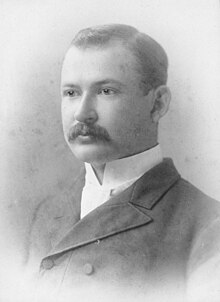John Spencer Bassett
| John Spencer Bassett | |
|---|---|

Bassett in 1891
|
|
| Born | September 10, 1867 Tarboro, North Carolina |
| Died | January 28, 1928 (aged 60) Washington, D.C. |
| Alma mater |
Duke University Johns Hopkins University |
| Occupation | Professor, historian |
| Employer | Smith College |
| Spouse(s) | Jessie Lewellin |
| Children |
Richard H. Bassett Margaret Byrd Bassett |
| Parent(s) | Richard Baxter Bassett Mary Jane Wilson |
John Spencer Bassett (September 10, 1867 – January 27, 1928) was an American historian. He was a professor at Duke University (then Trinity College) best known today for the Bassett Affair in 1903 when he publicly criticized racism among Southern elites, and called Booker T. Washington, "all in all the greatest man, save General Lee, born in the South in 100 years." In the face of widespread outrage, the college trustees refused to accept Bassett's resignation by a vote of 18 to 7. After Duke, he became a professor of history at Smith College in Massachusetts. and was the Executive Director of the American Historical Association for many years.
Bassett was born September 10, 1867 in Tarboro, North Carolina. John Spencer Bassett was the second of seven children of Richard Baxter Bassett (son of Richard and Caroline Spencer Bassett) who was born September 20, 1832 in Williamsburg, Virginia and died March 25, 1902 in Goldsboro, North Carolina; and Mary Jane Wilson (daughter of John Wilson and Susannah Dunn of Maine) born November 7, 1845 in Edgecombe County, North Carolina, and died September 1, 1903 in Durham, North Carolina. Both of his parents are buried in Willow Dale Cemetery in Goldsboro, Wayne County, North Carolina.
He entered Trinity College (now Duke University) in 1886, as a junior, graduating with an A.B. in history. In 1894 he earned a Ph.D in history from Johns Hopkins University, under the direction of Herbert Baxter Adams. As one of the first PhD's trained at Johns Hopkins University in Baltimore, he was introduced new models of scholarship to college education.
In 1902 Bassett launched the South Atlantic Quarterly, a journal whose purpose was to promote the "literary, historical, and social development of the South." It was from this journal that Bassett began to challenge more aggressively the southern press and prevailing sentiments about southern history and issues revolving around race. In October 1903 he published an article in the South Atlantic Quarterly titled "Stirring Up the Fires of Racial Antipathy" triggering a controversy that nearly cost the young professor his job. In the article, he spoke about improving race relations and gave praise to numerous African Americans. Near the end of the article, he wrote "...Booker T. Washington [is] the greatest man, save General Lee, born in the South in a hundred years..."
...
Wikipedia
